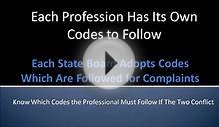
Mental Health Counseling Code of Ethics
The American Mental Health Counselors Association (AMHCA) represents mental health counselors. As the professional counseling organization of mental health counselors, AMHCA subscribes to rigorous standards for education, training and clinical practice. Mental health counselors are committed to increasing knowledge of human behavior and understanding of themselves and others. AMHCA members are highly skilled professionals who provide a full range of counseling services in a variety of settings. Members believe in the dignity and worth of the individual and make every reasonable effort to protect human welfare. To this end, AMHCA establishes and promotes the highest professional standards. Mental health counselors subscribe to and pledge to abide by the principles identified in the Code of Ethics.
This code is a document intended as a guide to: assist members to make sound ethical decisions; to define ethical behaviors and best practices for Association members; to support the mission of the Association; and to educate members, students and the public at large regarding the ethical standards of mental health counselors. Mental health counselors are expected to utilize carefully considered ethical decision making processes when faced with ethical dilemmas.
-
Counselor-Client Relationship
- Primary Responsibility
Mental health counselors value objectivity and integrity in their commitment to understanding human behavior, and they maintain the highest standards in providing mental health counseling services. -
- The primary responsibility of mental health counselors is to respect client autonomy, dignity and promote client welfare.
- Mental health counselors are clear with clients about the parameters of the counseling relationship. In a professional disclosure statement, they provide information about expectations and responsibilities of both counselor and client in the counseling process, their professional orientation and values regarding the counseling process, emergency procedures, supervision (as applicable) and business practices. Information is also provided regarding client rights and contact information for the state counseling licensure authority.
- Confidentiality is a right granted to all clients of mental health counseling services. From the onset of the counseling relationship, mental health counselors inform clients of these rights including legal limitations and exceptions.
- The information in client records belongs to the client and shall not be shared without permission granted through a formal release of information. In the event that a client requests that information in his or her record be shared, mental health counselors educate clients to the implications of sharing the materials.
- The release of information without consent of the client may only take place under the most extreme circumstances: the protection of life (suicidality or homicidality), child abuse, and/ or abuse of incompetent persons and elder abuse. Above all, mental health counselors are required to comply with state and federal statutes concerning mandated reporting.
- Mental health counselors (or their staff members) do not release information by request unless accompanied by a specific release of information or a valid court order. Mental health counselors make every attempt to release only information necessary to comply with the request or valid court order. Mental health counselors are advised to seek legal advice upon receiving a subpoena in order to respond appropriately.
- The anonymity of clients served in public and other agencies is preserved, if at all possible, by withholding names and personal identifying data. If external conditions require reporting such information, the client shall be so informed.
- Information received in confidence by one agency or person shall not be forwarded to another person or agency without the client’s written permission.
- Mental health counselors have the responsibility to ensure the accuracy of, and to indicate the validity of, data shared with other parties.
- Case reports presented in classes, professional meetings, or publications shall be disguised so that no identification is possible. Permission must be obtained from clients prior to disclosing their identity.
- Counseling reports...
RELATED VIDEO



Share this Post
Related posts
Masters of Mental Health Counseling
BECOME ELIGIBLE FOR NY STATE LICENSURE AS A MENTAL HEALTH COUNSELOR For less in tuition costs than other programs! The City…
Read MoreCity College Mental Health Counseling
*Note: The program admits for the fall semester only. Total Credits: 60 GRE Required: No Minimum TOEFL/IELTS Scores: 550…
Read More










